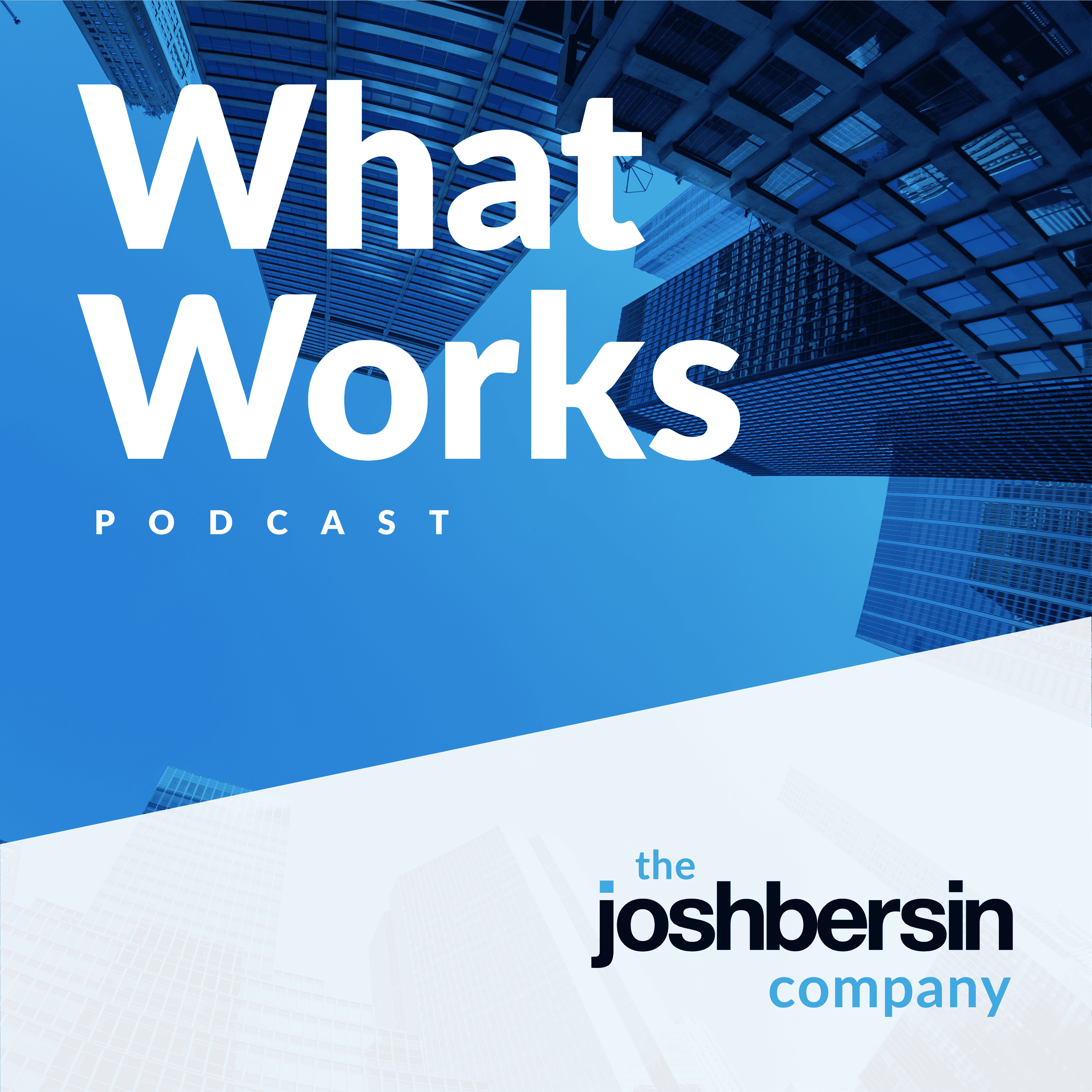Episode Transcript
Speaker 0 00:00:01 Hi, this is Josh Buron. Welcome to Research-Based Perspectives on the Ever-Changing World of Work, leadership, learning, and HR with a heavy dose of insights on the exciting world of HR technology. One of the most difficult topics to discuss in business is diversity. Not only is diversity a vexing problem for human resources, but it challenges executives, business leaders, recruiters, people that are in charge of pay practices, training people, virtually everybody in the company. And the reason for that is that it's a very complex problem. Right now, we're very focused on black injustice, black lives matter, and racial and income inequality. But it really goes far beyond that because everybody is diverse in some way. Two white people might have different nationalities. Age is a diversity measure, gender is a diversity measure. There's multiple genders, obviously there's race. In fact, there's dozens of factors of diversity. And we all come to work with bias.
Speaker 0 00:01:06 We come to work with the bias of the community. We grew up in the family, we grew up in our parents and the experiences we had as young people. In my particular case, I grew up in the Oakland and Berkeley Hills. I went to an all-black high school mostly. I now live in a highly diverse community, so I'm very sensitive to these issues. But most of my career has been working in companies that are primarily run by and operated by white people. And so as much as I would like to be diverse in my thinking, I know quite well that I probably have the same blind spots as everybody else. So it's a complicated problem. Let me mention three things that are important to consider, and I give you another way to think about it. The first is, there's absolutely no question that in the business standpoint, being a diverse company, having a diverse, inclusive, and equal and fair culture will give you greater financial performance.
Speaker 0 00:02:06 It is well proven. Diverse boards have higher performance than white male boards. Companies that do business in diverse communities need diverse employees to identify the right products and services and to reach those customers effectively. And if you're recruiting in technology or any scarce skill, many of the best people in those skill areas might be Indian or from another country. And so you have to be inclusive in your recruiting practices. One of the more interesting case studies of diversity that I remember quite well is Schneider Electric. Schneider Electric is a very successful electrical manufacturing company that builds power systems headquartered and founded in France. In the early days, the executives were French white males, and the company expanded all over the world and suddenly realized that it's two fastest growing markets were China and India. Now, they were doing okay in those markets, but those markets needed special products, special sales forces, special channel strategies, special marketing strategies.
Speaker 0 00:03:07 And so they made a strategic decision to split the company into four headquarters, one in Boston, one in India, one in China, and one in France. And as a result of that, created an enormously strategic diversity agenda to hire and promote local nationals in a diverse slate of candidates in all areas of the world and break down the silo of the Francophile origins. In fact, Scotiabank went through exactly the same process when they expanded into Spanish speaking countries. The other factor that drives performance is that diverse teams outperform. We did a study at Deloitte, it's very interesting, called Waiter, is that Inclusion in Your Soup? It's one of the more memorable titles. And what we found is that the teams that are more diverse by gender, age, race, and nationality were more innovative. They performed at a higher rate. People felt safer and individuals in those teams were much more highly engaged with their company.
Speaker 0 00:04:11 So that's number one. This is a good thing to do. Number two, the diversity and inclusion strategy is a difficult thing to implement in most cases. There is a d and i leader, sometimes this person is in hr. Sometimes this person is a peer of the head of hr. And this is a difficult job because this person's job is to create programs and training and metrics and guidelines and rules that will create a diverse culture in the entire company from top to bottom. Talk about a change management problem. And of course, they have to work with the CEO and embed diverse leaders throughout the company in order to create a diverse culture and diverse environment. Unfortunately, in all the work that I've done as an analyst over the years, we've found some incredible diversity programs, oftentimes in food service, retail and hospitality, and some of those types of industries.
Speaker 0 00:05:08 But the people in those jobs were in some cases pushing an agenda that was hard to get adoption. And in most of the companies that became highly diverse, and I particularly remember my experience at ibm, which had an incredibly open culture, despite its button down nature, the d and i leader has to play many roles. They have to establish these roles and guidelines. They have to hire a team of diverse managers and leaders around the company. They have to create resource groups. They have to create role models, they have to tell stories, they have to do training, and they have to continuously coach the top leadership team to work harder than ever to recruit and promote a diverse candidate all over the company. And we are starting a diversity and inclusion institute in the Josh Bur Academy, which I'll be very excited to tell you a little bit more about in the coming weeks and months.
Speaker 0 00:06:04 The third thing I want to mention about diversity though is something completely different. And this just came out of the last several months of experiencing Black Lives Matter. Now, I think I've told some of you that I live in Oakland, California. I grew up in Berkeley. I went to a mostly black high school in Richmond. And so I've lived in a culturally diverse environment for most of my adult life. And I'm very aware of the fact that black people in particular have a very difficult time in this country for a whole variety of reasons going back for 400 years. And we're not gonna fix that with a DNI program. And I'm also aware of the fact that there's no way a white male like me who went to a Ivy League school and Stanford and got an MBA can really completely understand what it's like to be black.
Speaker 0 00:06:55 But there is something we can do. And I think the word is something that I saw plastered all over the billboards and in graffiti all over Oakland over the last few weeks while I've been riding my bike. And that is the word unity. Unity is an interesting word. Unity doesn't refer to diversity. It doesn't mean change of behavior, it doesn't mean training. It means acting as one. And in all the conversations I've had for the last two and a half to three months with 150 or more companies about response to the pandemic, the most existential story I've heard over and over and over again from companies is that the pandemic brought the company together. It made us one. It made us one company. We became more sensitive to each other's needs and issues. We started talking to each other in a more transparent way. We started paying attention to family issues and personal issues in a positive and businesslike manner.
Speaker 0 00:08:00 And we invested in people like never before. And this sense of unity or acting as one is one of the most powerful tools we have to deal with diversity and inclusion. Now, unity doesn't mean exclusivity. I just had an interesting six and a half, seven years at a large consulting company, which has a very unified culture, but it is not a diverse company. And as I left the firm, I realized that it maybe wasn't as unified as I thought. And I would challenge you to think about this during the pandemic. Most of you have found yourself more interested in and more sensitive to the needs of others than ever before. This, in a sense, is the diversity, inclusion and equality agenda to pay attention to everyone in the organization and treat everyone as if they're part of the team. Now, this idea of unity also connotes Black Lives Matter.
Speaker 0 00:09:02 And it's interesting when you see the word unity on billboards, you often see a fist sometimes with some sort of an angry lightning bolt attached to it because unity also means power. And I think in the face of Black Lives Matter and racial injustice, unity can be a force of power in every single company. If you're a global bank and you believe in unity, then everyone who applies for that bank and joins that bank has the opportunity to be part of the whole. If you're a retailer or a food service company or a hospitality company, and you have low paid people doing operational jobs next to highly paid people doing sales, marketing, or other roles, unity means those people believe they're working together. As we launched the research study for the Big Reset initiative, I'm remembering the story of Sansbury's, one of the largest retailers in the United Kingdom.
Speaker 0 00:10:01 During the pandemic, of course, Sansbury's had all the problems of every other retailer. People weren't coming into the stores. The supply chain was messed up, the e-commerce was overloaded. The delivery systems were not capable of the demand. And the CEO and the leaders at Sansbury got together with the other retailers in the UK and created an initiative called Feeding the Nation. And what happened, and you can read about this in the research we're launching in July, is the entire company came together. The supply chain came together, the growers came together, the business partners came together around the mission of feeding the country. Because in a pandemic, there are a lot of people that can't get food. They either can't get access to food, they don't have enough money to get food, or they don't have the logistics to get food because all the restaurants and food service locations in their town may have shut down.
Speaker 0 00:10:58 And I won't tell you all the things that Sansbury did, but that's an example of unity. So as you think about DNI in a more holistic way, I encourage you to move beyond the programmatic aspects and think about whether your company really acts as one. I know companies don't like to think of themselves as families, but in this particular time, in this culture that we're living in now, unity may be one of the most important things we have. You're not gonna see it in the political system, at least not in the current regime, but you can see it inside of your company, and that creates a high level of listening and employee engagement. In fact, at a level we've never seen, many of you may have read the article that I wrote several weeks ago that most of the data on employee engagement shows that it is the highest it has ever been in the last 25 to 30 years or maybe longer. And I believe that one of the reasons for that is that companies now have a sense of unity. The diversity and inclusion agenda is not an easy one to address. And we're gonna take this on in the next sprint of the big reset. But let me just leave you with that idea that if you think about bringing unity to your company and unity to your company and its role in society, and the communities in which you serve, you will absolutely pull the agenda forward. Thank you very much.
Speaker 0 00:13:22 If you like what you heard, please join the Josh Bersen Academy, the world's professional development academy for hr for less than a cost of a nice dinner in a town near you. You can have an entire year's access to hundreds of courses, articles, research studies, case studies, and an entire community of more than 10,000 HR professionals all collaborating with each other to help you learn and solve the problems in your particular company. We call the Burson Academy, the world's home for hr, and you'll find it to be one of the most important parts of your career and your company's HR strategy for the years ahead. Thank you.


